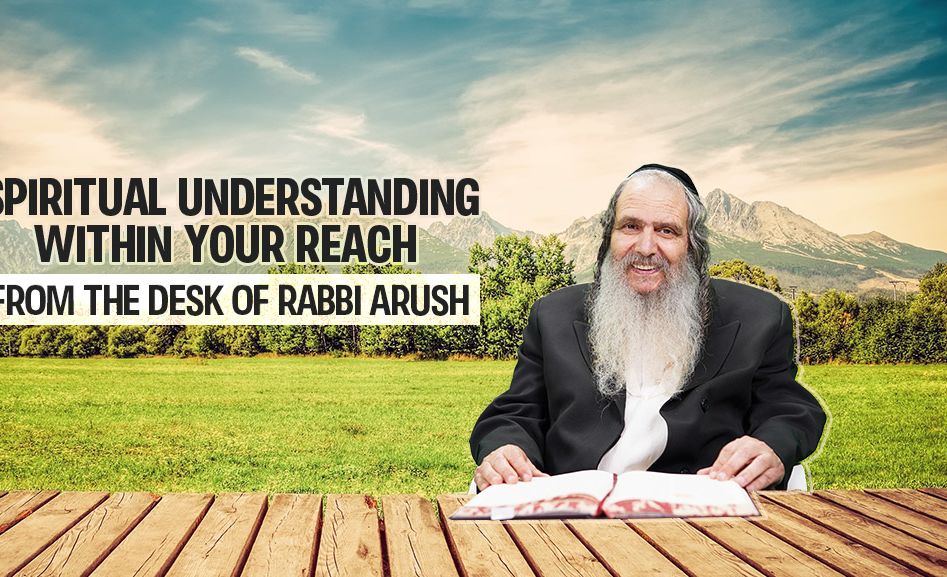
The Divine Intellect
Rebbe Nachman said: “The Divine Intellect that is in all things will enlighten him…because the sechel is a great light that can illuminate all one’s ways.”

Rebbe Nachman said: “The Divine Intellect that is in all things will enlighten him…because the sechel is a great light that can illuminate all one’s ways.”
Rebbe Nachman of Breslov writes at the beginning of “Likutei Moharan” (Chelek Aleph, 1):
“A Jew always needs to look at the sechel – Divine Intelligence, Intellect – that is in all things, and to connect himself with the wisdom and sechel that exists within all things. The sechel that is in all things will enlighten him and help him draw closer to God by means of that thing itself, because the sechel is a great light that can illuminate all one’s ways, as it is written (Kohelet 8), ‘The wisdom of a man enlightens his countenance.'”
Rebbe Nachman is teaching us that as Jews, we need to focus on the inner wisdom that can be found in every situation. We need to delve deeply into everything that happens to us, instead of simply accepting their superficial appearance. We can then integrate that wisdom into our understanding of the world, bringing ourselves closer to the Creator.
When facing a challenging test, or undergoing a life-crisis, we often find ourselves experiencing a special closeness with our Creator. That is the time to think about the situation and integrate the lessons that were gained into our understanding of the world, so that the sechel that exists in that situation will continue to illuminate our lives.
Rebbe Nachman provides us with guidance in our spiritual progress so that, when it comes to Divine service, we won’t be like a bull charging into a china shop. We need to understand ourselves and our limitations, and to realize that we can’t rely on first impressions to climb the ladder of spirituality.
Rebbe Nachman is telling us that the Creator’s Intellect is far beyond anything we could possibly fathom, and that relying on this knowledge is a springboard to higher spiritual attainments and self-improvement, especially when it comes to acquiring faith in God and humility.
Humility and Faith
Why are humility and faith so important?
Rebbe Nachman said: “…because the sechel is a great light that can illuminate all one’s ways.” He compares the light of the sechel to the light of the sun. The sun provides us with light and warmth, yet it is so powerful that it is impossible to look at it directly. We can either wear special dark glasses to protect our eyes, or through looking at the sun’s reflection in the moon, we can see the sunlight indirectly.
The sechel works in the same way. It is a great light within us, capable of showing us the way. But if a person thinks that he’s wise and knows everything, then he’s like someone blinded by the strong rays of the sun. He becomes arrogant and thinks only of himself. His faith, which should act like protective lenses to protect him, is weak.
But when we protect ourselves through the lens of faith, we remain humble and the light of sechel can illuminate our path without blinding us. We are able to understand the messages hidden within our experiences, and use them to become closer to Him. Since we are guided by our faith, we can have clarity in even the most difficult situations.
This is what Rebbe Nachman meant when he said, “Because the sechel is a great light that can illuminate all his ways” – even when it is dark and cloudy. In other words, we need clarity in even the most difficult situations.
We Aren’t in Control
Rebbe Nachman wrote, “The main purpose He created the world was for the sake of Israel was so that Israel would do His will, and they would return and cleave to their roots, which means that they would return and include themselves in Him, Who brings everything into existence, and this was the reason He created everything…the more they fulfill His will, the more they are included in all the Worlds that depend on them…but this merit – to be included in one’s root – can only be achieved by self-nullification, he must nullify himself completely, until he is included in the Oneness of God. It’s impossible to come to self-nullification without hitbodedut, because by secluding himself and conversing with his Creator he can nullify all his physical desires and bad character traits, until he merits nullifying his corporeality and including himself in his root” (Likutei Moharan Chelek Aleph, 52).
Speech is what gives us the ability to look at our inner world and rectify it. As long as a person remains quiet, no one knows who he is, what he wants and what he desires. But the minute he speaks, we know if that person is humble or not. Therefore Rebbe Nachman says that need to use hitbodedut to reach this level of self-nullification and to have this sechel.
The story of Yaakov and Esav illustrates this point:
Yaakov and Esav were twins. They were raised together, learned together and played together. So how did they turn out to be the opposite extremes of each other?
As the lads grew up each one turned to his heart’s desire: Yaakov was a wholesome man, he learned Torah and he wanted to grow spiritually. Yaakov wanted to perfect his character, strengthen his faith and nullify himself.
Esav, on the other hand, was a hunter, a man of the field. He busied himself with idol worship, licentious behavior, and other wicked character traits. This shows us that he was full of arrogance. Because of his arrogance he despised the rights of the firstborn and sold it for a pot of lentils (which alludes to his materialistic cravings).
Rebbe Nachman explains that Yaakov understood the inner meaning of the rights of the firstborn – it represented wisdom, as it says: “The reishit (beginning) of wisdom (Tehillim 11),” and “reishit” – beginning – is comparable to the “first”-born and wisdom is called “reishit.”
Since Yaakov aspired to spirituality and true wisdom, he jumped at the opportunity to buy the rights of the firstborn, and the blessing it contained. Rebbe Nachman says: “Wisdom and sechel are the life-force of all things.” Yaakov knew this. But Esav despised the rights of the firstborn – wisdom and knowledge – and preferred physical comforts.
When Yaakov bought the rights of the firstborn – wisdom and sechel – he gained the ability to see the sechel that is inherent within everything and “to connect himself with the wisdom and sechel that lies within all things. The sechel that is within all things helped him draw closer to God by the means of that thing itself.” This took place because this was his ambition in the first place – he wanted to grow spiritually.
When Yaakov attained this important tool, the sechel, he was able to achieve great heights in spirituality: he nullified himself to his Creator, merited elevated character traits, understood that there are no accidents and that everything comes from Divine providence and was for the best, and that everything that happened was a message containing the sechel that he needed to bind himself to and thereby come closer to his Creator.
This is the message of Rebbe Nachman. A Jew must know there are no accidents in the world. There is sechel in everything. We have to use our intelligence to connect to the sechel so that the sechel will light up our path. But if we don’t want to become blinded by the light of sechel, we must don the sunglasses of faith, humility and all the other good traits.
Yaakov was in the hands of the yetzer hatov (good inclination) and Esav was in the hands of the yetzer hara (evil inclination). Rebbe Nachman explains (ibid.):
“The good inclination is called ‘poor and wise’ (Kohelet 4), like Kingship, which is poor and lowly, and has nothing of its own except what it receives from Wisdom. (This is Yaakov).
“And the evil inclination is called an ‘old and foolish king’ (ibid.), like the Kingship of the Other Side, which desires neither wisdom nor intellect, as it is written: ‘a fool has no delight in understanding.’ (This is Esav).”
When we realize that we’re ‘poor and wise,’ and that we have nothing, we can be in the hands of the yetzer hatov and understand the sechel that is in everything. But if we choose the ‘old and foolish king,’ and we pursue success, status and fame that come from the ego, then we’ll be in the hands of the fool, the yetzer hara.
In Sefer Midot Rebbe Nachman adds: “A man may think, ‘I’ll do so and so and then I’ll achieve so and so,” but know, he won’t achieve anything.”
Whenever a person makes calculations from an egotistical point of view, the Almighty says: “He and I cannot dwell together – only when he becomes humble again can we dwell together.” When a man says, “No problem, everything’s under control,” God says, “I see that you can do fine without Me.”
Rebbe Nachman of Breslov began his work “Likutei Moharan” with this message, because it demonstrates the importance of man’s intellect. Additionally, it shows us how to develop our intellect. These points are the basics of our spiritual development.
“Happy are they who are perfect of way, who walk in the Torah of God” (Tehillim 119). Wholesomeness – which includes humility, faith, trust and all other good traits –connects us to the sechel that exists within everything and illuminates the most painful and dark situations.
Why?
When we erroneously think that we’re in charge, we are carrying a heavy load on our shoulders. He must worry about everything and plan for all the eventualities – after all, it’s our responsibility.
But if we realize that we’re not in charge, and that God is running the show, then although we put in a lot of effort and try our utmost, the ultimate responsibility is His, and not ours.
All of us face challenges and struggle with doubts. When we have faith in the Divine Intellect, we have the strength to cope. When we have this faith the “light of the moon becomes like the light of the sun,” and then we’ll have life, wisdom and knowledge of the truth.
Only then we’ll know how to look at the sechel that exists within everything.











Tell us what you think!
Thank you for your comment!
It will be published after approval by the Editor.